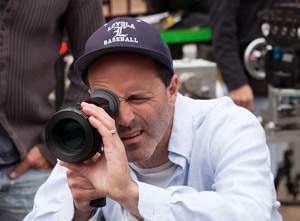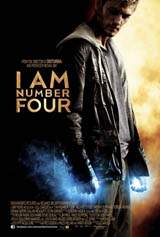
I had read the manuscript and then a few versions of the book as it progressed.
If the book wasn't even out yet, how did you know where the author was going with the story?
I was able to read the manuscript and the outline for book number two. This allowed me to understand the path that each character was heading down.
Did you feel the need to stay true to the original book?
Or were you more interested in telling your own version of the story? Of course I wanted to honour the intentions of the book. I made some changes that I felt would be more cinematic. I also make sure that there is specific reason that inspires me to tell the story.
I Am Number Four is your first directing effort in the science fiction genre. Why did you choose I Am Number Four to adapt?
I was looking for a somewhat family friendly science fiction film like the great ones in the 80's that I grew up watching like BACK TO THE FUTURE. I felt that I AM NUMBER FOUR had qualities that I could tap into that would satisfy that desire. That is why I was attracted to the material.
Beyond fantasy and thriller, is the real issue of the movie the search for love and a normal life?
Once you accept who you truly are, you become empowered to great things with your life. In his quest for normality and true love he learns that his destiny calls on him to sacrifice the things he truly wants. He must become selfless. For a young man or alien (ha ha) that is a tough thing to accept.

What sort of challenges did you run into adapting I Am Number Four into a movie?
All films present tremendous challenges. I AM NUMBER FOUR was loaded with special effects and the number of shots grew. Blending visual effects with the teenage drama. That was a challenge, not to allow the effects to overtake the characters. We had less than nine months to finish the film. So it was a full court press to make our release date.
Why was the film's production schedule so short? Dreamworks and Disney had a specific release date and window that had to be hit. It was the driving force behind the short schedule.
What was the one thing you dreaded about directing I Am Number Four ? What's your least favourite part of your job as a director?
I dreaded the quick turn-around. I love to tinker and play with the film in post. There was just too little time. I am blessed to be a director. There is nothing about it that I dread.
Is it difficult to have creative control while having to incorporate a studio's vision with yours?
The more success you have, the more you are trusted to do your thing. I find that the studio's marketing departments can be the ones who cloud the vision of the filmmakers more so then the creative studio team.
Was Michael Bay intimately involved in the production? Or did he remain at a distance?
Michael Bay was a first class producer. He allowed me the space needed to direct and was always there when I needed help. He was very helpful in Post and helped me conquer some visual effect shots that were driving me crazy.
You have done plenty of action-thrillers. Have you always wanted to do a big sci-fi effects movie? Someday I will do a big budget sci-fi film. I AM NUMBER FOUR was done for a very modest price with good bang for the buck. I would love to get back into this arena someday.
What balance did you try to strike between the film's story, special effects and action?
I always lean towards character and theme. Once the theme is defined in my head, it informs me about how the film should look, sound and feel. The effects and action should move the story and theme forward.
There were more special effects than you usually have. Did you have to adjust as director?
Yes. I usually love to have practical elements in all my frames. In I AM NUMBER FOUR that was not possible at times. So blending the practical and visual effects was a new challenge. So yes, I made adjustments to accommodate this type of film.
Is it hard to imagine what the scene will look like finished, and how difficult is it to make them look real and impressive without distracting the viewer from the film? I always have a specific vision. I would say if I get 75% of what I imagine, I'm happy. But it is tough. I spent many nights colour timing and tweaking so that the blend would be as seamless as possible.
While filming, what was the most challenging sequence of the movie? How did you manage to accomplish it?
The technical challenge of the final battle was the most challenging. We shot the football field sequence in just four nights. The wire work, explosions and fighting pushed the envelope of what could be done on our budget with the time allotted.
Can you give us some tips on directing an action scene?
1. No matter how good the stunt is, if the camera is in the wrong place, you'll never fully appreciate it.
2. Action with incident is more involving for the viewer. Action needs to advance the story.
3. When action has a visual effects element, make sure that practical destruction happens within the frame. This blends better than all CGI.
Where did you find inspiration for creating these terrifying Mogadorians? Maybe took something from existing animals?
I wanted the Mog look to be very strong in silhouette. I loved the old black western duster jackets. Their membrane eyes and gill-like breathers were of course alien inspired. Finally, the Tattoos were a tribal ranking system that we developed for each Mog.
In speaking with Visual FX Supervisor Bill George, it was clear he has tremendous respect for your vision and direction. How do you personally inspire your various production teams to give their all? First and foremost is to respect their creative input. A director must inspire those around him or her to do great work. Bill is brilliant. He cares so much about the story. Bernie and the Piken are two fully fleshed out characters and Bill and his team attacked and developed them with passion.
Do you have a film or TV show that inspired you to enter the industry?
The TV show that I became addicted to was Steven Bochco's Hill Street Blues. The dynamic characters and reality based filming style just blew me away. There are soooo many films that inspired me I wouldn't know where to begin. I assure you that Scorsese films would lead my list.
You worked on Smallville's first steps, directing the very first episode and happen to work with script writers' Alfred Gough and Miles Millar. What lessons from Smallville did you learn and happen to redo or not on I Am Number Four ?
Number Four does mirror Superman's journey. I always made that connection. Also, a hero being reluctant to use his powers resonates in both Smallville and I AM NUMBER FOUR. These similarities were helpful because I was revisiting themes that I had explored before.
You've worked in TV and film, do you have a preference over one medium? How are they different for you as a director?
TV is a great way to learn and experiment. It moves at a much faster pace and the discipline it requires taught me how to approach scenes and how to manage a day’s work. So when I direct a film I feel like the "workout" I did in the TV world has prepared me to kick ass on the film. Obviously, film is my preference, but I love doing great TV.
If the studio asks for a sequel, will you be interested in doing it?
Of course I would be interested. I think Number 6 would be a great character to take the next level.
Have you thought about completing the rest of the story arc as a TV series rather than the long production cycle of movie sequels? No, but I like that idea!
What drew you to each of the young actors you eventually chose when casting?
Alex brought a strong physical presence and he also had a very accessible quality. Dianna had a grace and intelligence that the character required. Callan was perfect for Sam because he embodied Sam's pain and struggle, but maintained a cool quality. Teresa was just plain kick ass in the room.
Which movies and directors do you think influenced your work the most?
Coppola, Scorsese, Spielberg, Ashby
What is the influence of Spielberg's movies?
Steven's love of science fiction and endearing characters is of course present. I felt like the darkroom scene where he uses his hand to light her face was very Spielbergian. Homage...
Now that you've done a sci-fi film, are there other films in that genre you're in discussion to direct?
I think the only genres that I can't relate to as a filmmaker are comedies and romantic comedies. I can watch and enjoy them. I am developing a small drama, a dark drama/thriller and wacky modern western with amazing characters.
What is your next project?
Preacher at Sony based on Garth Ennis’s graphic novel is the object of my obsession right now. John August wrote a great script and we are fine-tuning a draft now. Also working on a very small indy entitled Goats.
Visitors from other planets, in whatever shape or form, good or bad, are a huge part of our popular culture. Why, in your view, do they have such an enduring appeal?
The mystery of the unknown. What we don't know allows our imaginations to run wild. It is exciting to speculate on what is out there.
Conspiracies and paranoia seem to be a recurring theme in your films. Is this something you enjoy exploring?
They are universal themes that the audience can experience and relate to. They understand the character's plight. Technology has brought these themes to the forefront. Big Brother is here!
I AM NUMBER FOUR is out on DVD and Blu-ray from 20 June and can ordered from Play and all good retailers.